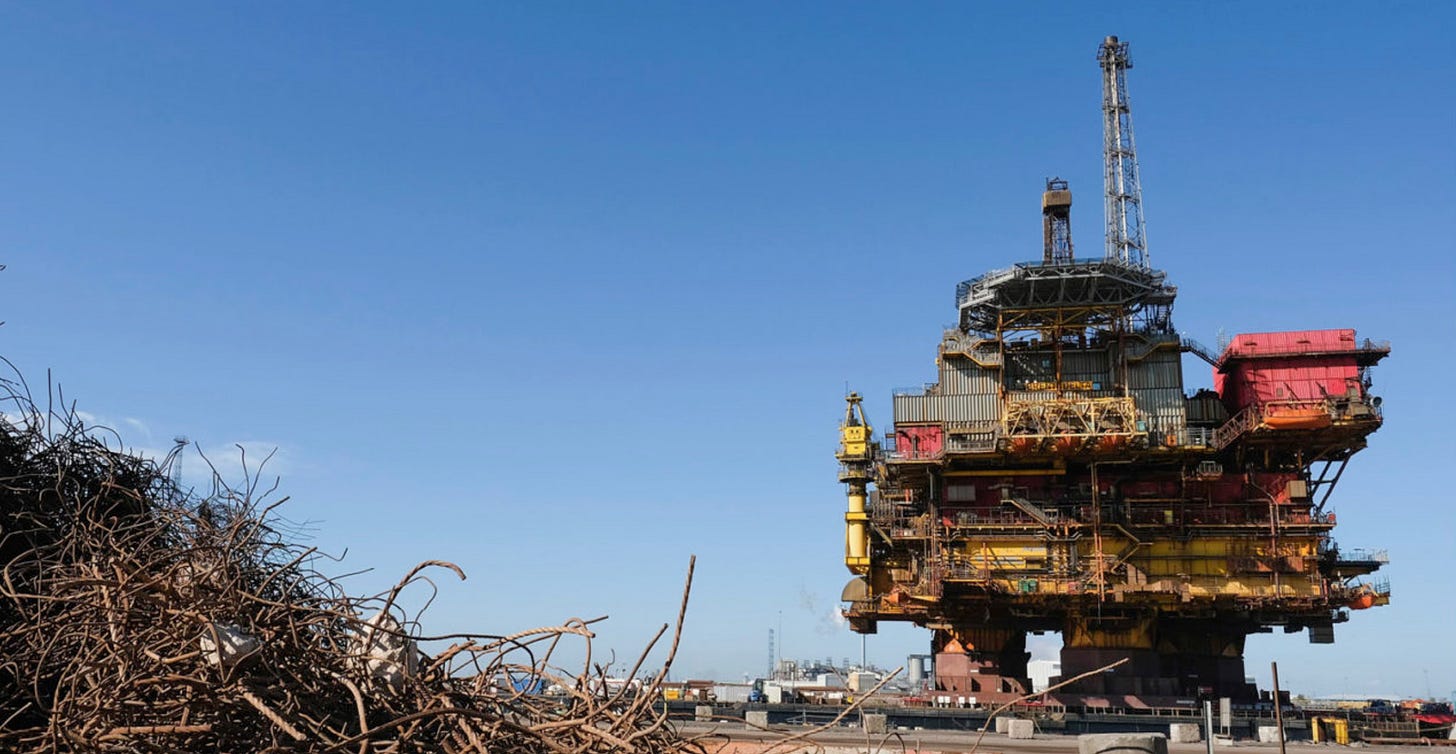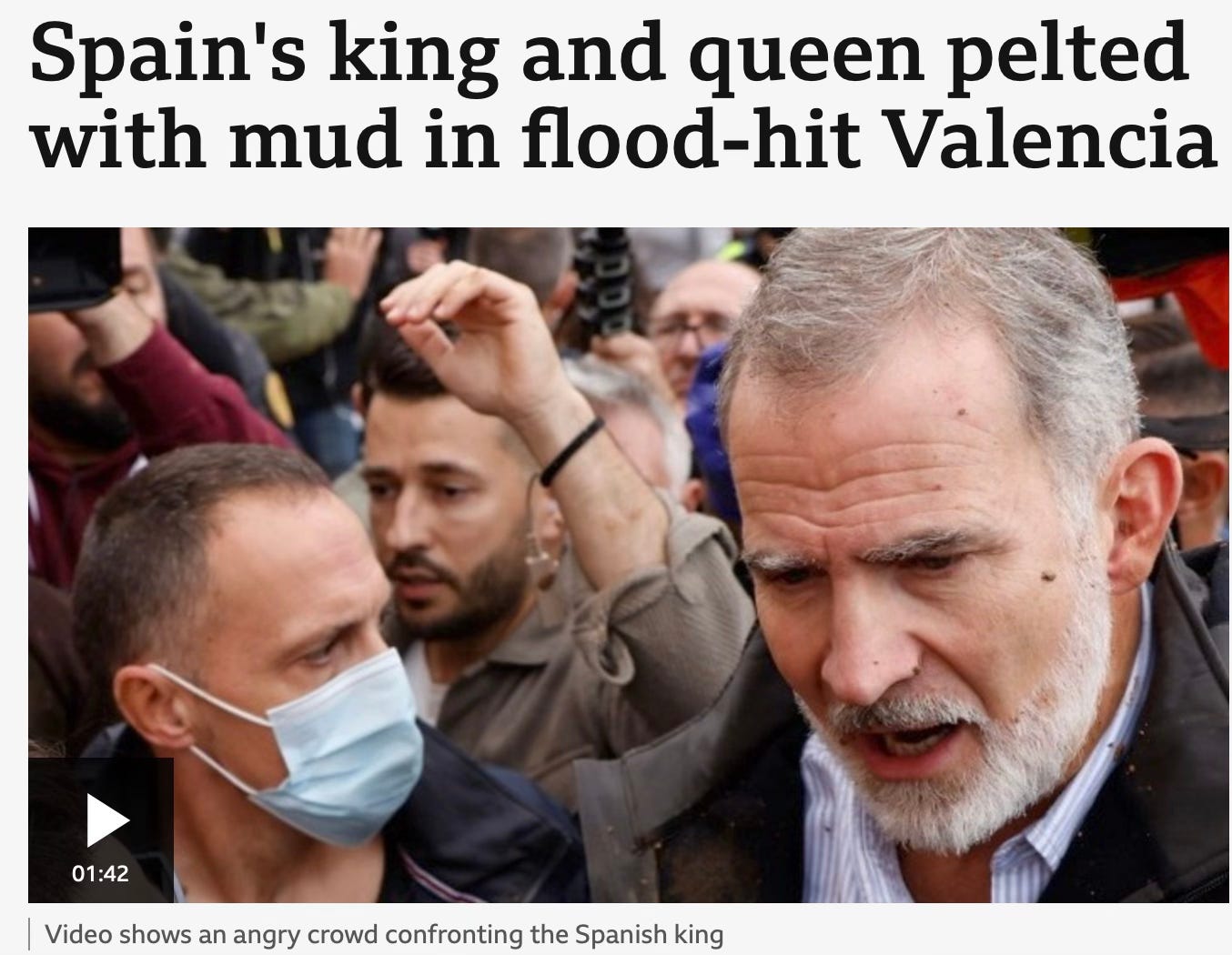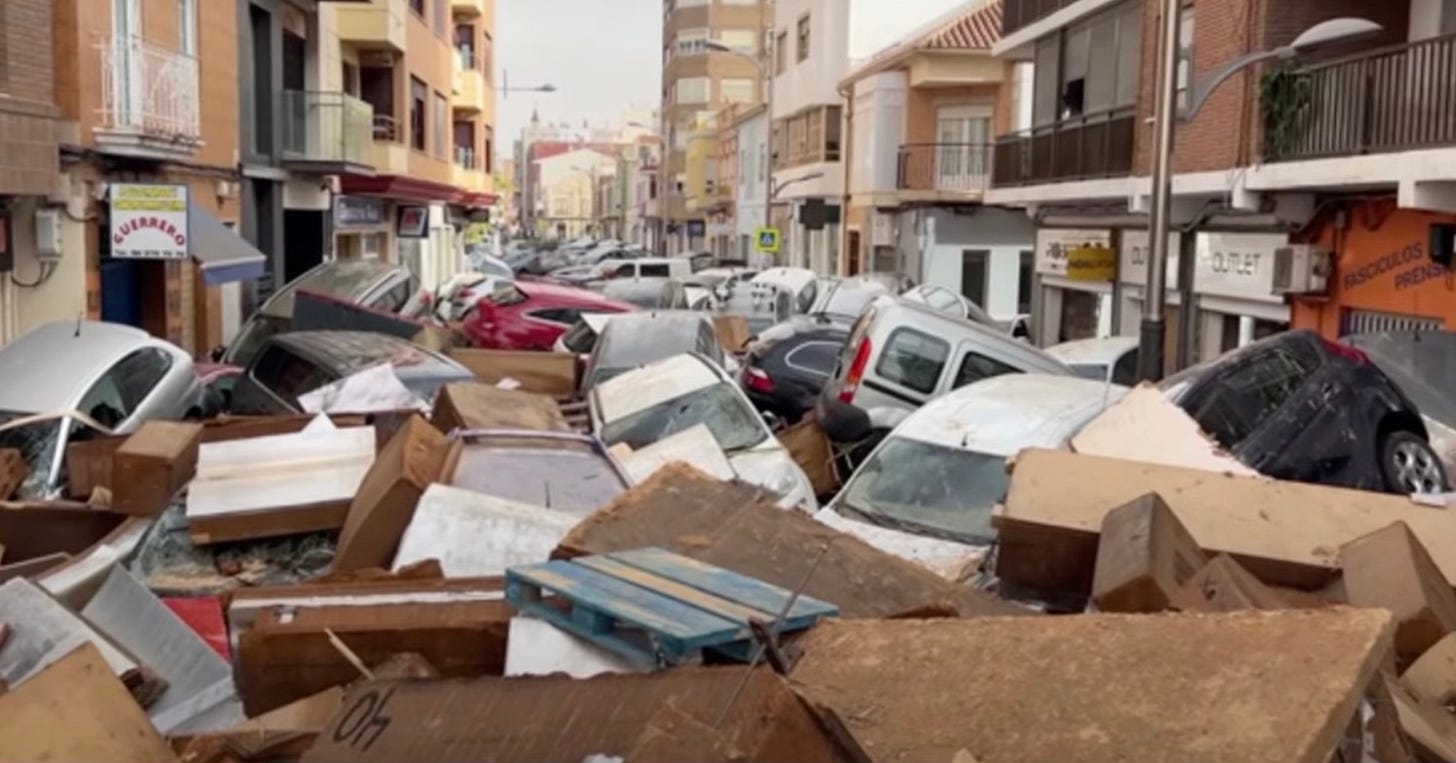Big Government & The Threat of Stranded Assets
The third global threat: a politically induced systemic event
Before I begin, may I wish you, my subscribers, hearty thanks for your support through 2024. May I also offer my sincere hope that every one of you will have a safe, peaceful and fulfilling year in 2025.
This post is about the third great challenge likely to confront the global economy in 2025. Recurring climate crises, and associated social and political upheavals will, I contend, pressure Big Government into taking action, for both national security reasons, but also in response to demands from Big Oil.
Such state interventions could ultimately lead to another ‘Minsky Moment’: the systemic stranding of valuable, global fossil and financial assets.
In unprecedented scenes in November, 2024, the King of Spain, representing the Spanish state, was attacked and abused by an angry crowd after floods in Valencia region killed 200 people. The BBC reported that
Shouts of "murderer" and "shame" were directed at the royal couple as they walked through the town of Paiporta - one of the worst-affected in the region.
Objects were also thrown at Prime Minister Pedro Sánchez, who was quickly evacuated.
The Spanish state and its political parties are vulnerable to climate change. As experts at Medecc argue, the country and the region will experience ongoing warming, exceeding global average rates of the atmosphere and the sea. Explosive downpours intensified by climate change will exacerbate the kind of social unrest witnessed above, and demands for a political response.
The human and biodiversity cost of that global rise in temperature in 2024 has been immeasurable, as witnessed by Cyclone Chido’s recent impact on the carbon-sequestering forests of Mayotte, an archipelago in the Indian Ocean.
While both the ecological and human cost to Mayotte is likely to be immense, the people of those islands have little political agency: Mayotte is France’s (and the European Union’s) poorest territory. Its 326,000 people are represented by just one deputy in the French national assembly and by two senators.
Nevertheless, the social and political costs of climate change-induced disasters may prove to be higher for big governments like those of Spain, India, China and Western Europe. It will pressure governments into politically-induced changes to first the national, regional and then the world energy, political and economic order. That in turn could threaten the valuation of assets, including fossil assets, currently highly valued. They could instead become ‘stranded assets’.
What are stranded assets?
As explained in an earlier post, the continuous and accurate valuation of assets is at the nerve-wracking heart of today’s financial capitalism. The degree to which a borrower/investor institution can leverage additional finance (debt) depends almost entirely on the value of the asset or collateral that backs the borrowing. (Much as the ability of a homeowner to arrange a bigger mortgage depends on the lender’s valuation of her existing home, or collateral.)
Flawed valuations can, at the global level, be the cause of systemic crisis (as happened in 2007, and explained in this post) - and of losses for global investors and asset managers - unless and until they are compelled to face reality; to accept the lender’s devaluation of an asset/collateral; and then to suffer massive losses.
‘Stranded assets’ are assets that suffer unanticipated or premature write-offs, downward revaulations or conversion to liabilities, as Andreas Malm and Wim Carton explain in their latest book, Overshoot.
Like “milch cows killed before their time is up.”
Malm and Carton do not believe that fossil fuel assets (defined as assets that contribute to the financing of exploration, exploitation, distribution - including transportation, refining, etc. - of oil, gas and coal, and the production of electricity from these sources) - will be subjected to spontaneous redundancy.
Nor will they be stranded through competition or epochal crisis.
Instead, they argue, the transition away from fossil fuels will lead to stranding enforced by political actors.
Mark Campanale, founder of the Carbon Tracker Initiative, hammers home the point made by Malm and Carton:
“If we get extreme weather events at 1.5 degrees warming, policymakers could turn around and say,
”right, everything closes. Nobody drives a car today. Coal-fired power stations are off. Oil production stops.”
Decisions such as those cited by Campanale could lead to what economists call a ‘Minsky Moment’ - an event whose impact is not confined to any single industry or state, but becomes systemic - in other words, an event that destroys or transforms a global system.
As Malm and Carton explain:
“Asset stranding would then be politically induced destruction of value awaiting or undergoing valorisation within the circuits of fossil capital.
-the political destruction of fossil capital.”
European and American fossil car companies are already facing a threat posed by Big Government: the Chinese government’s auto industry subsidies and lower labour costs - all a consequence of deliberate government policy. These and threaten both the EU and US auto industries, as the FT reported in October:
Chinese manufacturers have stolen a march technologically and are supplanting foreign rivals in a market where, in July, half of all vehicles sold were EVs or plug-in hybrids. China’s upstarts benefited from huge state subsidies and lower labour costs, and started from a cleaner slate. They grasped more quickly, though, that EVs’ value lies more in snazzy software and electronics than in mechanics.
The consequences for the auto industry in both the EU and US will be the ‘stranding’ of the industry’s assets.
Big Government has form
Big Government interventions in transforming industries and economies, have a long history. Below I outline a few - some of which are contemporary and familiar to most readers.
The 1807-33 Abolition of Slavery
The impact of politically-induced decisions to alter the valuation of the asset that was black plantation labour was immense, in both Britain and the United States. Even while they were generously compensated by the British state amongst others, plutocratic wealth was weakened by abolition.
The 1933 Collapse of the Gold Standard, aided by the Roosevelt Administration
As the historian Eric Rauchway explains in his book, The Money Makers, President Roosevelt took the United States off the gold standard almost immediately, and unilaterally, after his election in 1933.
The supporters of gold were big-business plutocrats; while the proponents of a new monetary model were political progressives sensitive to the needs of farmers and workers. The Roosevelt administration’s decision was to be transformational of both the US economy, but ultimately also the global economy
The Nixon Shock of 1971.
Richard Nixon’s decision to delink the dollar from gold, “put a gun to the head of all other countries”; was announced without warning in August 1971, and remade the global monetary system in an instant.
Yale faculty talked with author Jeffrey E. Garten about the three days of drama leading up to the announcement:
Sunday night, Nixon went on television and very clearly articulated what had been decided. The dollar would not be backed by gold anymore. There would be a 90-day wage-price freeze in the U.S. to put down inflation. And he imposed a 10% tariff on all imports, which would be removed only after there was a new international monetary agreement. That put a gun to the head of all other countries. Not only was it done unilaterally, but it was done with enormous force. The United States could never get away with that again—it was a singular moment. These policy changes had enormous implications. It’s hard to think of a bigger economic package announced all at one time.
Other forms of major state interventions include:
The Big Government Bailouts of 2007-9 and of March 2020
The role of Big Government during 2019-2023 COVID Pandemic
The election of Donald Trump?
In the meantime the world awaits the likely impact of the the 2025 inauguration of Donald Trump as president. While he regards climate change as a hoax, he and his team, as the New York Times reports are determined the US government should intervene in the global political order to acquire two countries profoundly affected by climate change: Greenland and the Panama Canal. Greenland’s retreating ice has already opened up areas for the mining of critical minerals and for oil and gas drilling by American corporations. As his former national security adviser, Robert C. O’Brien, suggested to the NYT, Greenland is “the critical battleground of the future” both because it opens up shipping routes, reducing dependence on the Panama canal, but also because global warming offers US corporates opportunities for oil, gas and mineral exploration. This may in turn “heighten the risk of environmental disasters” as Amanda Lynch, a professor at Brown University who has studied climate change in the Arctic for nearly 30 years. told the NYT.
Among the many threats Donald Trump’s administration poses to the global economy, his imperial ambitions to acquire land belonging to independent sovereign states may be the kind of state intervention that, if effective, could disrupt both the global political and climate order.
Machiavelli, if he were here to advise, would have warned that
There is nothing more difficult to carry out, nor more doubtful of success, nor more dangerous to handle, than to initiate a new order of things.





The risk of enormous fossil fuel stranded assets is exactly why the sector has been using its connections and wealth to create a narrative of doubt around climate change.
It’s been successful.
Where I don’t agree with Ann is that nation states will successfully create a ‘Minsky Moment’. They’ve proven hopelessly bought. Look at Aussie PM Kevin Rudd’s destruction when he attempted just a super profits tax.
Still, we live in hope.
The reason solar is a threat and will likely do the job is not because right now it can supply base load but because the choice for any new supply is so obviously solar in terms of installation / speed of return and (for now) massive profit while retail is pegged to more expensive fossil explains the scramble for solar installation.
That’s more likely to cause a minsky moment.
I’ve gone into more detail here: https://youtu.be/abCfZTM2_EQ
This is an interesting perspective and I think the abrupt changing of economic rules through history is an interesting way to present this idea.
I do see one big difference, and that is my belief/observation that what put humanity into a population overshoot condition IS our extensive burning of hydrocarbon based fuels, so while the mechanics of such a sudden decision will be similar in concept, the effects will be MUCH more broadly felt, than even the sudden abolition of slavery in the British Empire was.
Back then we still pretty much lived in a hand cranked horse drawn world, which is NOT the case today.